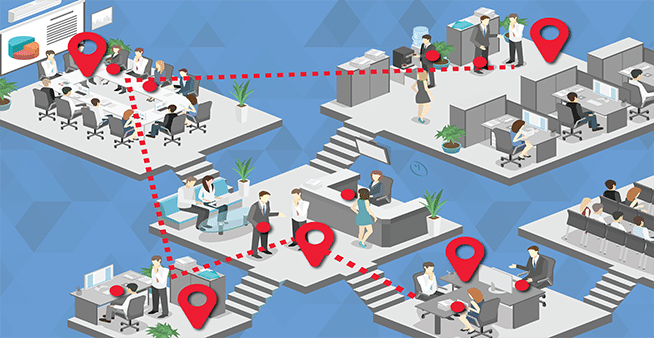
As states ease stay-at-home guidelines and companies, offices, and facilities continue to reopen, one fact stands out: COVID-19 has not yet been defeated, and the disease remains a threat to public health. Although efforts are fully underway to develop a vaccine, such protections do not yet exist, so workplace precautions must be taken and other efforts, such as contact tracing, made to help reduce the risk of exposure to employees, visitors, and the community.
What is contact tracing?
Contact tracing, the gathering of accurate data concerning which individuals have likely been exposed to the virus or may have developed symptoms, is a proven method of controlling the spread of infectious diseases. Once a person has been identified as a likely exposure risk, that person is encouraged to self-isolate, and information about exactly who that person has come in contact with is gathered. Then, health officials track down each of those other persons and obtain the same information, creating a web of connections among the population and a picture of the spread of the disease.
As public health officials seek to understand the spread of the virus and keep new infections to a minimum, companies that manage the entrance of visitors to their facilities can play a significant role. By screening every visitor and recording key data such as date and time of visit, the person hosting the visitor, and the area of the building the person is authorized to visit, companies can create a valuable data set that health officials could use to track possible person-to-person spread of COVID-19. But such efforts have the potential to generate masses of data and managing that data can be an enormous task. That is where the advantages of an automated visitor management system, such as LobbyGuard® Visitor Management, can step in.
Why Automated Visitor Management Is Key
LobbyGuard is adaptable for use in virtually any lobby or reception environment, either in assisted-entry situations in which a reception staff member performs all check-in tasks, or in unassisted self-service kiosk configurations. Specific visitor entrance records are automatically and securely recorded within the system, are password-protected to prevent inadvertent distribution, and robust reporting functions mean that records can be easily retrieved and compiled by approved users for sharing with public health officials should an entrant subsequently fall ill or test positive for the virus and contact tracing efforts be warranted.
LobbyGuard recommends retention of personal and specific entrance details for every visitor, including date, time, location in the building, host name, personnel contacts, etc., for at least 28 days to aid possible in-depth contact tracing.
Privacy, privacy, privacy
Contact tracing might raise concerns regarding medical privacy; public health officials are ethically and legally bound to protect personal information and use it only for public health purposes. Health officials would notify others who have been in your facility only that they may have been exposed to someone who has come down with the virus. Respecting the individual privacy of those persons known to have become infected is of the utmost importance. LobbyGuard software safeguards all collected data with ultra-secure Microsoft cloud storage. No personal or screening data should be shared other than for such public health purposes.
For more complete information regarding the role of automated visitor management in the age of COVID-19, read our eBook, or contact us here.
